By Whose Authority?
Posted on March 8, 2018
Politics and patronage are nothing new to the governance of North Carolina’s state universities. The conservatives now in control are uchoaising questions about the line between setting policy and micromanaging. (Illustration by Delphine Lee)
Politics and patronage are nothing new to the governance of North Carolina’s state universities. The conservatives now in control are raising questions about the line between setting policy and micromanaging.
by Barry Yeoman
If a single moment could define the political battle over control of the UNC System, it came when Thomas Fetzer, a member of the system’s Board of Governors, invoked the 20th-century’s leading conservative stateswoman.
It was September 2017. Fetzer, a corporate lobbyist, was a newcomer to the board, which is elected by the N.C. General Assembly and sets policy for governing the state’s 17 public institutions of higher learning. But he was hardly new to politics. He got that start in the 1980s at the National Congressional Club, which raised millions of dollars for then-U.S. Sen. Jesse Helms, a pugilistic opponent of civil rights laws, HIV funding and foreign aid. Fetzer later served as mayor of Raleigh, where he pushed for tax cuts and, like Helms, campaigned against publicly funded art. More recently, he chaired the state’s Republican Party.
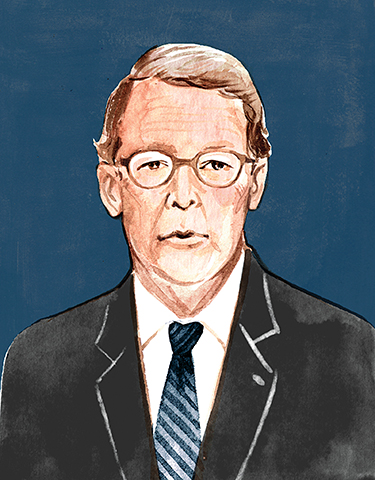
Tom Fetzer (Illustration by Delphine Lee)
Now, at his second Board of Governors’ meeting, Fetzer had a message for his colleagues: The days of peaceable consensus were over. “I wanted to read you a definition of consensus from one of my heroes,” he said, naming the late British prime minister Margaret Thatcher. “ ‘Consensus: the process of abandoning all beliefs, principles, values and policies in search of something in which no one believes but to which no one objects.’
“Raging internal conflict is a long-held American tradition,” Fetzer continued. During the Constitutional Convention of 1787, “some states packed up and went home. There was anger. There was passion. There was emotion. But look at the result.”
Fetzer already had provoked some internal conflict of his own. In August, he helped draft an email scolding UNC System President Margaret Spellings and BOG Chair Lou Bissette ’68 (JD) for their reaction to growing Silent Sam protests in Chapel Hill. The email, signed by 15 of the board’s 28 members — including five of its eight newcomers — said it was “wholly unacceptable” for Spellings and Bissette to write to Gov. Roy Cooper ’79 (’82 JD) without the full board’s approval and raise the possibility of removing the Confederate statue for safety reasons.
“The letter exuded a weakness and hand wringing that does not accurately reflect the Board’s opinion,” the letter read. “We would have preferred a strong statement … that while our campuses have long been a hospitable forum and meeting place for the peaceful dissemination of contrasting views, lawlessness, vandalism, and violence will not be tolerated and will be punished to the fullest extent of the law.”
At that meeting, Fetzer and his allies offered a series of surprise motions aimed at re-examining how the UNC System is governed. (One motion launched a study of whether to relocate UNC System headquarters out of Chapel Hill “to remove the appearance of being more closely aligned with any single campus.”) Some members described the motions as a sneak attack. But all motions were passed.
The September showdown hinted at a larger change washing over the Board of Governors. Since Republicans took control of the Legislature in 2011, they have incrementally appointed BOG members whose philosophies break sharply from many of their predecessors.
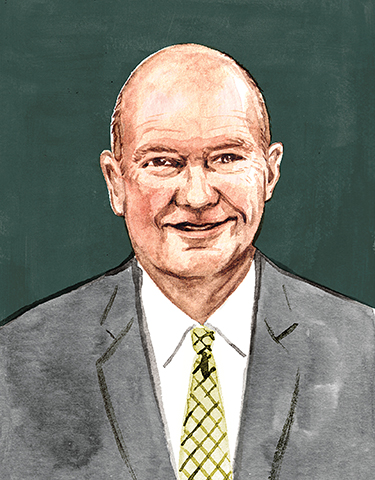
Harry Smith (Illustration by Delphine Lee)
Many favor running the system more like a business. They talk about lowering tuition and creating a leaner system focused more tightly on its core functions. “Higher education, just like health care, is under a tremendous amount of disruption,” Vice Chair Harry Smith Jr., a business executive, said in September. “There is a tremendous amount of opportunity to do things quicker, smarter, faster and better.”
Board members also have vigorously questioned how the University System operates day to day, from the size of Spellings’ staff to the role of civil rights advocacy.
They’ve done so in a hard-charging style that occasionally breaks into open conflict. “This board is the most divided board that I’ve ever been on and ever seen,” businessman Frank Grainger, the board’s longest-serving member, said in a November committee meeting. The division resurfaced in January, when two members criticized Bissette for writing an op-ed column calling for the board to stay out of both political controversies and the day-to-day management of the system. “A lot of us felt that there was an accusation leveled at members of the board,” said member Marty Kotis ’91.
Bissette, who has remained publicly diplomatic about the tension, has been franker in private. “The noose is tightening!” the chair wrote to BOG member George Sywassink, in an email obtained by the news service N.C. Policy Watch, after the Silent Sam message arrived.
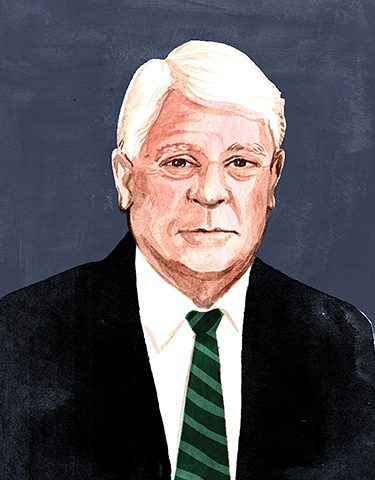
Lou Bissette (Illustration by Delphine Lee)
The discord has signaled a welcome change to some. “We are moving away from a board that rubber-stamped,” said Jenna A. Robinson ’05 (MA, ’12 PhD), president of the Raleigh-based James G. Martin Center for Academic Renewal, which advocates for conservative higher education policies. “If you attended meetings prior to the last five years, all you would see is a series of yes votes. It wasn’t clear that the board was adding any real oversight to the UNC System. Now, you’ve got a board that is taking that oversight role seriously.”
One person’s oversight, though, can be another’s micromanagement. Critics, including some current and former BOG members, say the board has overstepped its role and undercut the authority of Spellings and the chancellors, often around issues outside their expertise.
“We are blurring the lines between policy and management,” BOG member Joe Knott ’74 (’80 JD) warned last fall. “This, long term, is a recipe for chaos. … We are not equipped to run this institution.”
The divide is among Republicans, not along party lines (the 28-member board has one Democrat, and five are listed as unaffiliated). Knott and Grainger, like most board members, are Republicans. So is Bissette, the chair, and Spellings, who in 2017 told a TV reporter, “Let me manage the enterprise and let them set policy.” So is former BOG Vice Chair Roger Aiken, an investment banker who — like many others — suggests the board is flexing its political muscle for the wrong reasons.
“Every August, in every one of those 17 campuses, parents drop their kids off,” said Aiken, who served until last year. “Those parents don’t really care who’s on the Board of Governors. They want a better life for their kids. And so, at the end of the day, I tried to ask myself, every decision we made, ‘Is that in their best interest?’ I’m not the least bit interested in power for power’s stake. From that standpoint, I’m disappointed with what I’ve seen.”
UNC and Its Governors: Same as It Ever Was
Scuffles over governance go back to the founding of the University in Chapel Hill. Many of the issues sound familiar today — the role of politicians, the autonomy of administrators, even how to respond to unruly students.
In the 1780s and ’90s, the Legislature granted the new University two revenue sources: land confiscated by the state and “escheated” land that was unclaimed after its owners’ deaths. Those modest gifts fostered considerable resentment. The University’s champions, and much of its faculty, were Federalists. Their opponents, the Republicans, controlled the Legislature at the turn of the 19th century. Republicans disliked the University for political reasons, and the ill will was compounded by “reports of the misbehavior of students, undoubtedly bad, but grievously exaggerated,” wrote Kemp Plummer Battle (class of 1849), UNC’s president starting in 1876, in a history of the University.
In 1800, the Legislature withdrew UNC’s funding mechanism and clawed back all the unused escheated land. Federalists were mortified. “Alas! Alas! the Legislature of No. Carolina about to wage war against the arts and sciences. I blush for my native State!” wrote Congressman Archibald Henderson. Former Gov. William Richardson Davie agreed: “The friends of science in other States regard the people of North Carolina as a sort of Semi-Barbarians.”
When the courts cried foul in 1805, lawmakers reached a compromise. They returned the escheated lands to UNC — and, in exchange, claimed the power to fill seats on the University’s Board of Trustees (the precursor to today’s Board of Governors). They forfeited that power in North Carolina’s 1868 constitution but regained it five years later and have held it ever since. Only New York’s board of regents and the five-campus University of Minnesota board of trustees have similar systems of pure legislative appointments.
The biggest modern-day dispute came in the early 1970s. It was described by both sides as a “holy war”: how to consolidate North Carolina’s four-year public institutions into a single system. Restructuring higher education meant sparring over how much power to give the new Board of Governors, how much to insulate the universities from political interference, and how much political and academic heft the original university would retain.
At the center of the debate were Gov. Bob Scott, who buoyantly championed the restructuring, and Bill Friday ’48 (LLB), president of what for 40 years had been the Consolidated University, which encompassed the original university in Chapel Hill, and what now are N.C. State University and UNC-Greensboro. Friday saw the need for better coordination but feared the shifting of resources away from Chapel Hill. The two men had clashed before, notably in 1969, when the diplomacy-minded Friday felt undercut by Scott’s decision to quell student civil rights protests with riot-trained state police.
The final plan, passed in 1971, represented a compromise; it did not end the conversation about governance. In 2001, the state and the Board of Governors were sued over a law setting BOG membership quotas based on sex, race and party affiliation. The lead plaintiff was Walter R. Davis, a former BOG member after whom a Carolina library is named. Rather than go to trial, the Legislature rescinded the quotas.
Then, in 2006, the N.C. Center for Public Policy Research, a nonpartisan think tank, warned that the BOG selection process had become “highly politicized” and “increasingly partisan.” The center called for a hybrid system in which the governor and Legislature shared appointment powers. A year earlier, the conservative John W. Pope Center for Higher Education Policy (the predecessor of the James G. Martin Center for Academic Renewal) had called for the governor to appoint all BOG members.
Neither suggestion was taken. In 2017, the Legislature made one significant change: It voted to gradually reduce the BOG’s membership from 32 to 24. (It’s now at 28.) The structure might be similar, but in tone, the current board is a new entity.
— Barry Yeoman
By definition, political
Seats on the Board of Governors always have been coveted gifts. “No one gets to the board unless you’re political,” says member C. Philip Byers, a retired sheriff. “This is a political board. You have to have ties to the Legislature.”
That was the case when Democrats controlled the process. It was natural that, when the Legislature changed hands in 2011, the new Republican leadership would follow suit.
The first rounds of Republican appointments sparked bitter debate. Democratic lawmakers said their party was shut out and noted that new members were overwhelmingly white and male. Republicans replied that these were the spoils of victory. “I would just remind you of one thing,” GOP Rep. Edgar Starnes said in 2013. “The Republicans won the election. We are in control.”
That year, appointees included one then-Democrat, hotel developer Doyle Parrish ’76. In his response, then-House Speaker Thom Tillis pointed out that Parrish had donated generously to Republicans. “I would estimate he is directly responsible for more than $100,000 in financial support,” Tillis, who is now a U.S. senator, wrote in a memo to legislative leaders.
“The board has way too many lobbyists and ex-politicians. You never know what their agenda is.”
— Frank Grainger, BOG’s longest-serving member
By 2014, the BOG’s new majority was making its ideology felt. It capped at 15 percent the amount of tuition revenue that could be set aside for need-based financial aid, arguing that this would help keep tuition rates low. It launched a review that led to the 2015 closure of Carolina’s law school’s Center on Poverty, Work and Opportunity. Both decisions came under fire for how they could affect low-income North Carolinians, first by limiting college assistance and then by shutting down a privately funded advocacy, training and research center.
The board’s most dramatic decision came in 2015: It fired then-president Tom Ross ’75 (JD), a Democrat, without explanation. Members praised Ross’ tenure and insisted the move was not political; BOG emails obtained by The News & Observer showed the firing was privately applauded by Republican politicians.
If the new board was moving toward congruence with GOP legislators, there was still room for conflict. That became clear during the hiring of Ross’ replacement. Spellings, a Texan who served as secretary of education under President George W. Bush, was a pragmatist who helped craft the No Child Left Behind Act of 2001, which passed Congress with bipartisan support. Her moderation on some social issues rankled conservatives; once, asked about the decline of traditional two-parent families, she answered, “So what?”
Spellings impressed Joan MacNeill, a Republican who chaired the BOG’s search committee. “My belief was that we were tasked to find [and] interview the best qualified pool of candidates and to hire someone who would take the university to the next level,” said MacNeill, a retired entrepreneur and nurse. “I believe we accomplished that.”
During the search, though, MacNeill says a fellow board member informed her that legislative leaders wanted another candidate: former BOG Chair Peter D. Hans ’91, who has advised several prominent Republican politicians. “They made it eminently clear,” she said. “They were very careful that I never heard directly, but it was very clear where the message came from.”
That, for MacNeill, was a turning point. “The search brought to a head the desire of the Legislature — certain very powerful elements of the Legislature — to control the outcome,” she said. “When that didn’t happen, I think there was a long-term strategy to make sure they populated the board with members who would carry out their bidding.”
McNeill was not reappointed in 2017; nor was former vice chair Aiken, who had helped narrow down the candidates. “I believe there were politics behind it, pure and simple,” Aiken said.
The Legislature’s top leaders, House Speaker Tim Moore ’92 and Senate President Pro Tempore Phil Berger, did not respond to requests for comment. Neither did Spellings or Fetzer.
The current Board of Governors has numerous ties to the General Assembly. Its 28 members include five ex-lawmakers and five current and former lobbyists. Legislators now sit in on committee meetings, and Jane Stancill, a higher education reporter for The News & Observer, noted in an article that BOG member Tom Goolsby ’91 (JD), a lobbyist and former legislator, “has repeatedly told his fellow board members that they should pay closer attention to what the legislature wants.” Goolsby did not respond to interview requests.
“The board has way too many lobbyists and ex-politicians,” said Grainger, the veteran member. “You never know what their agenda is.”
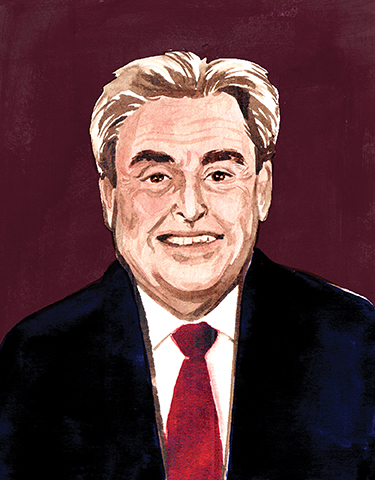
Bob Rucho (Illustration by Delphine Lee)
Member Bob Rucho, a former Republican state senator and retired dentist, says these political connections are overblown. His primary obligation, he insists, is to students, their families and taxpayers, but his closeness to lawmakers doesn’t hurt. “I have a lot of friends in the Legislature that I can pick up the phone and say, ‘You guys need to think about funding summer school to help us achieve our four-year graduation-rate goals,’ ” he said. “If we don’t have a relationship with them, what’s the chance of getting extra money?”
Targeting tuition?
The four sequential votes at September’s board meeting provide a rough guide to the new majority’s priorities.
The first resolution pledged to “endeavor to reduce tuition and fees” at all UNC System schools. “We’ve outstripped the affordability of the average working North Carolina family,” Fetzer said. “One out of three students who leave us [do so] for economic reasons, not academic reasons. And I think that’s a tragedy.” Applications for admission are up significantly at three system schools — Western Carolina, Pembroke State and Elizabeth City State — for which the Legislature mandated a $1,000 annual tuition in 2016.
The motion passed without audible nays. Before the vote, though, several members warned against making such a blanket pledge. “Excellence is not cheap,” Knott said. “We can’t starve the University in the name of free tuition, or whatever, and expect our top-level institutions to continue to be ranked and recognized nationally and internationally.”
Left undebated was whether reducing tuition would, in fact, improve student outcomes — particularly now that the schools cannot set aside more than 15 percent of their tuition revenues for need-based financial aid. In November, UNC Chancellor Carol L. Folt told the board that low-cost, low-aid schools tend to have low graduation rates and that institutions in the UNC System face that prospect unless they can help poorer families more.
“Every time we turn around, we see a new vice president or associate dean for some new program. The scope of the [UNC System] hasn’t been looked at in probably three decades. Do you think education and society has changed during that period of time?”
— Bob Rucho, BOG member
The other three resolutions created committees to study various pieces of how the system is run: the staffing and purpose of the system offices and its headquarters; whether to move its offices to Raleigh or Research Triangle Park; and whether chancellors and their staffs need to attend every BOG meeting, as they currently do.
No final action has been taken on these issues. Supporters insist there is nothing ideological or inappropriate about challenging long-held assumptions. “It’s been portrayed as a bunch of folks coming in, riding high on a steed,” said Byers, the retired sheriff. “No. With new members, you have folks who have given money to the universities, attended the universities, cheered for the universities, and all of a sudden now they’re on the board. So we’re getting a great influx of new ideas, and I think that’s perceived as micromanaging.”
Each of the ideas under study, say advocates, has a legitimate basis. Moving the administrative offices to Raleigh, maybe even to a shared campus with the K-12 and community-college headquarters, could promote the cross-fertilization of ideas. Dropping the expectation that chancellors attend all meetings would reduce unnecessary travel in an era of teleconferencing. Re-evaluating bureaucracies is standard organizational practice.
“Every time we turn around, we see a new vice president or associate dean for some new program,” said Rucho, the former state senator. “The scope of the [UNC System] hasn’t been looked at in probably three decades. Do you think education and society has changed during that period of time?” To be clear, it’s not uncommon for UNC System presidents to evaluate the administration; at Spellings’ behest, the UNC Foundation commissioned a $1.1 million study of its organizational effectiveness. Rucho, who chairs the BOG task force, says he wants it to go deeper, examining whether the administration is, in fact, providing the right services to the institutions.
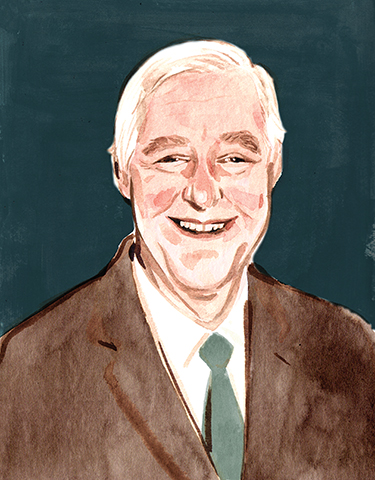
Joe Thomas Knott (Illustration by Delphine Lee)
Critics, some of whom decline to talk publicly, say there is a political agenda buried in the benign language of the resolutions. One high-ranking official at a system school described Rucho’s task force as an effort to “disempower” Spellings. Knott has described it as “a back door for communication” with the president’s employees, “undermining her administrative and supervisory power.”
Chapel Hill absorbs hits
The September board meeting lasted two days. The four resolutions passed on Thursday. Then, on Friday, the board stripped Carolina’s law school’s Center for Civil Rights of its ability to provide legal representation to poor and minority North Carolinians. (See “Shutdown,” January/February 2018 Review.)
BOG members said the center was harming taxpayers by suing government entities, such as local school boards, over racial discrimination.
To the Board of Governors’ critics, the vote was one of several actions designed to silence those who believe the University’s resources should be harnessed against economic and racial inequality. To that list, they add the closure of the Center on Poverty, Work and Opportunity — which, like the Center for Civil Rights, was associated with Gene Nichol, the Boyd Tinsley Distinguished Professor of law and an outspoken critic of many North Carolina Republican politicians.
They also cite the closure of a center at N.C. Central University that was established “to empower communities of color”; the financial aid policy, which limits assistance to needy families; the firing of Ross, who once ran a large philanthropic organization that funded social justice work; the law-and-order approach to Silent Sam protesters; and a “free speech” policy, passed in December, that sets out escalating punishments for disruptive protesters. The penalties culminate in the presumption of expulsion for students and termination for faculty after three offenses.
“Higher education, just like health care, is under a tremendous amount of disruption. There is a tremendous amount of opportunity to do things quicker, smarter, faster and better.”
— Harry Smith Jr., BOG vice chair
BOG members have courted Princeton University legal scholar Robert George, whom The New York Times calls “this country’s most influential conservative Christian thinker.” George runs the James Madison Program in American Ideals and Institutions; board members have visited George and hosted him in Chapel Hill and have talked about wanting to see a similar program here.
The sum total of the board’s actions “definitely raises the possibility that there’s an ideology regarding whose rights matter, whose comfort matters, and wanting to maintain a status quo that isn’t healthy or helpful for marginalized members of the community,” said Erika Wilson, the Reef C. Ivey II Term Associate Professor of law at UNC.
BOG Chair Bissette, a former trustee at Western Carolina and Wake Forest universities, disputes the conclusion. “You can string all those together, but I don’t see it as part of an ideological plan that should be regarded as an onslaught against anybody. Each one has different facts. And, sure, you may not agree with them. But all of those things were developed with a lot of input and a lot of thought.”
Wilson and other faculty worry that the board’s actions send a signal that certain issues are dangerous to raise on campus. “It diminishes the quality of faculty who want to operate under those restraints,” she said. “If you have an interventionist Board of Governors, it reduces the chance that you’re going to get top-flight faculty who want to be able to come and do their work unencumbered by political machinations.” And some of those who do come, she says, might “walk on eggshells.”
Michael Palm, associate professor of media and technology studies, says the recruitment issue extends to graduate students, too. “In the past couple of years,” he said, “money has been replaced by politics as the No. 1 reason that people report that they choose not to come to UNC for a PhD in communication.”
Faculty members have been at the forefront of challenging the Board of Governors. Pushback from the Faculty Assembly helped moderate the free speech policy. Last year, the assembly also brought its concerns to the Southern Association of Colleges and Schools, which accredits Southern universities and requires that governing boards be free from “undue” political influence.
George Leef, director of research at the Martin Center, dismissed the faculty’s SACS memo as ideological posturing. “What is going on here is that the Board of Governors consists largely of conservatives who are trying to exert control over the very leftist faculty and administration,” he wrote in the National Review. “Whining to SACS that the Board is doing things that violate accreditation standards is just a desperate ploy.”
But some faculty insist the times warrant forceful action. Appealing to the accreditator, they say, is the only leverage they have.
Barry Yeoman is a freelance writer based in Durham.
Thanks for reading the Carolina Alumni Review
Carolina Alumni members, sign in to continue reading.
Not yet a member? Become one today.
